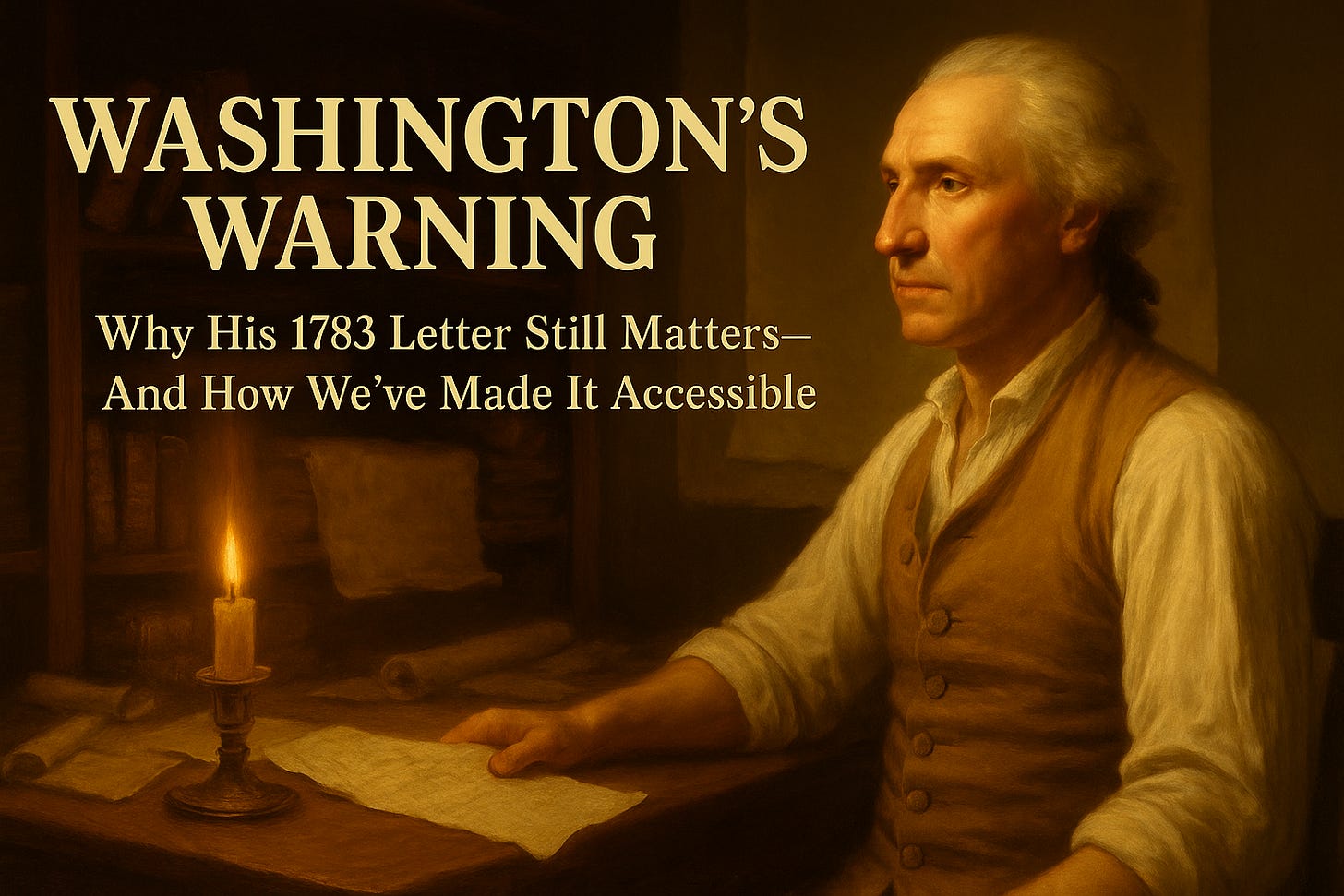THE GENERAL’S WARNING
What Washington Saw Coming—and What He Wanted Us to Do About It
George Washington was done with war.
The fighting was winding down. The Treaty was not yet signed, but the battlefield had gone quiet. Independence had been declared and defended.
But peace didn’t feel safe.
The nation was broke. Congress powerless. The army restless. States squabbled like rival tribes, and a few lies could fracture their hard-won unity.
And Washington—tired, scarred, and yearning for Mount Vernon—saw exactly where it could all go wrong.
Before stepping down, he wrote one last message. Not to take credit. Not to boast. But to warn the states—and through them, warn the people—what must be done if the Revolution was to mean anything at all.
His Circular Letter to the States, written in June 1783, was not a farewell.
It was a flare shot over the horizon—meant for the next generation.
He passed the torch with trembling hands, hoping we’d carry it with steadier ones.
WASHINGTON’S BLUEPRINT
📜 What is a Circular Letter?
In the 18th century, a circular letter was a strategic message sent to multiple recipients—typically leaders—to align decisions and preserve unity across a fragile system.
Washington’s letter wasn’t a formality. It was a strategic directive—a final act as Commander-in-Chief that reached every state executive and was printed nationwide. It sparked debates that helped shape the Constitutional Convention four years later.
It was tactical, prophetic, and deeply personal.
Washington warned that the real test of the Revolution wasn’t battlefield victory. It was what came next—when celebration faded and self-interest crept in.
The Four Pillars
Washington’s warning rested on four non-negotiables—foundational supports that had to hold if the republic was going to stand.
1. An Unbreakable Union
Washington had seen the dangers of fragmentation firsthand. States like Rhode Island refused to fund troops. Supplies dried up. Congress begged. The army nearly starved at Valley Forge.
So he called for a stronger federal center—not to dominate the states, but to unite them under a shared structure.
“Without a central power to govern shared concerns,” he wrote, “the Union cannot last.”
He didn’t seek tyranny—he pleaded for cohesion.
2. Public Justice
The war had racked up massive debts—not only to foreign allies like France, but to the very soldiers who had bled for independence.
Washington demanded those debts be honored.
“It is a debt of honor... the price of their blood and your independence.”
These were literal and moral obligations—millions owed, promises made, lives risked.
To ignore them wasn’t just a fiscal failure. It was a collapse of character.
3. A Strong, Ready Militia
Washington didn’t want a standing army. But he wasn’t naïve enough to think peace would last forever.
He called for a standardized, disciplined militia across all states—trained, equipped, and prepared.
This wasn’t paranoia. It was protection.
4. A Spirit of Civic Unity
More than any law, Washington believed in national affection—the cultural glue that binds a people together.
He urged Americans to “forget their local prejudices,” abandon selfish advantage, and choose the whole over the part.
This wasn’t just idealism—it was structural wisdom.
Like teammates chasing a championship, citizens must sacrifice for the shared good.
“No law can save a people who stop caring about each other.” — George Washington
No document, no army, no leader can save a people who stop caring about each other.
TACTICAL DEPLOYMENT
Many Americans have never read this letter—not because it lacks relevance, but because the language of 1783 takes effort.
So we rewrote it.
Not to water it down—but to unseal it.
The content, structure, and voice are intact. But it’s now in clean, modern English. So students can read it. Teachers can teach it. And citizens can grasp what was being said when the future teetered on a knife’s edge.
Download the full modern-language edition here:
https://protocolone.gumroad.com/l/WashingtonCircular
It’s free. But if you’d like to support the project, you can name your own price.
Join us in reviving Washington’s vision. Your download, your shares, your support—it all helps us bring this wisdom to the surface again.
AND WE’RE JUST GETTING STARTED
2026 marks the 250th anniversary of the American founding.
And yes, I’m a bit of a history geek—especially when it comes to the Founding. I don’t see powdered wigs—I see generational minds wrestling with questions that still confound us today.
Modern culture likes to posture—armed with apps, AI, and algorithms, mistaking tools for wisdom. But dismiss the 18th-century mind at your own peril. The Founders would run intellectual rings around most modern adults. They’d outmatch anyone dismissing their vision as outdated.
What they lacked in tech, they made up for in philosophy, design, and foresight. And what they built? You’re still living in it.
Their vision, forged in a flawed era, still shapes our nation.
Throughout 2026, we’ll revisit the original frameworks, letters, declarations, and prayers that launched a republic. From the Declaration to the Farewell Address, we’ll retranslate, reexamine, and reignite the core operating code of liberty.
This is the first ignition point.
FINAL TRANSMISSION
Like a general’s last order, Washington’s warning was for us.
He could’ve gone quiet. He could’ve chased glory.
But he offered a reckoning.
He saw the fracture points. He named the temptations. He begged us not to waste what was won.
“The Union cannot last without a central power to govern shared concerns.” — George Washington
This wasn’t a love letter to liberty. It was a dare to preserve it.
We’re 242 years removed from that letter, yet every warning applies. Today, 62% of Americans say polarization is a major threat (Pew Research, 2024), echoing Washington’s fear of division. Our $33 trillion national debt echoes Washington’s call to honor fiscal obligations.
Our Union feels fragile.
Our debts are denied.
Our unity is conditional.
Our civic muscle is atrophied.
Will we finish what he started—or let it rot while we fight for the microphone?
Read the letter.
Share the words.
Take the warning seriously.
Because history doesn’t repeat.
It remembers who paid attention.
#ReviveTheRepublic #WashingtonsCall
[FIN/ACK]
Transmission Complete
Process Accordingly
—Protocol One
If this drop helped you see the cultural fault lines a little clearer, consider buying me a coffee.
Your support keeps these flashpoints documented and decoded—without the filter of ad dollars or clickbait algorithms.
☕ Support the work: buymeacoffee.com/protocolone



